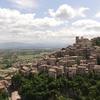Temple University Rome's campus is located at Via di San Sebastianello 16, adjacent to Piazza di Spagna—one of the most notable landmarks in the heart of the Eternal City and a UNESCO World Heritage Site. The new campus is walking distance from the iconic Trevi Fountain as well as famous monuments such as the Pantheon, Villa Borghese, Villa Medici and Mausoleum of Augustus.
Facilities include a variety of “smart” classroom spaces, well-equipped and professional studios for visual arts, printmaking, darkroom, digital photo, sculpture, painting and architecture, a science lab, student lounges, a contemporary art gallery, a conference center and a library with over 14,000 volumes.
Furthermore, Temple's campus includes terraces with views of Rome's city highlights and an open-air courtyard, as well as full disability access and a new 50-bed residence hall, offering a true campus experience in the heart of Rome.
Artena is a small hill town located approximately 40 miles southeast of Rome.
The archaeological site, a large artificial terrace that was part of an early Republican settlement, has revealed the remains of a Roman villa and other buildings that were in use from the 4th century BC until at least the 7th century AD. About 13,000 sq. ft. of the villa that started out as a small farmhouse to become a more sophisticated residence, have thus far been excavated.
The complex comprises an atrium, a peristyle with several rooms around it and a small private bath complex. Parts of it were decorated with wall paintings and mosaic floors. An aqueduct and large cisterns supplied the villa with water. Underneath and next to the villa important remains of pre-existing buildings of the Republican age, including another aqueduct, have been discovered. After the villa was abandoned, new structures were built that partially reused the villa and its material from the 4th to the 7th century AD. A small treasure with four gold Byzantine coins ends for the moment the occupation of the terrace. The history of the artificial platform illustrates in an impressive way the transformation of a site near Rome from a Republican town to an Imperial age villa to a late antique and early medieval settlement covering an arc of time of more than a thousand years.
Learn more about the facilities at Temple Rome.
View Temple Rome on Google maps.
Explore Artena on Google maps.
EXPLORE ROME!
Historically, Rome has few peers. Discover the possibilities of Rome -- a living museum, business center, and hub of Mediterranean culture. Rome offers the greatest co-mingling of the historic and the modern, where you will walk the streets of an ancient capital that has transformed through the centuries into a vibrant and magical contemporary city.
After you've visited all of the major tourist sites on your list, you will no doubt want to explore the local areas that most tourists never see. Rome is a city with many unique neighborhoods, making it fun to discover your favorite spots, those that will make you feel like you really have made Rome your home.
Read student blogs about studying in Rome.
EXPLORE ARTENA!
Artena is a medieval town located in the province of Rome, in the Lazio region of Italy. The hilltop town offers sweeping views of the surrounding countryside, including the nearby Valle del Sacco and the nearby mountains. Artena’s elevated position and charming medieval features make it a peaceful and scenic host location for the archaeology intensive program.
The town is characterized by its narrow, cobbled streets, stone buildings, and several important landmarks, including the Church of San Francesco and ancient Roman ruins, which highlight the town’s strategic importance in the past.


